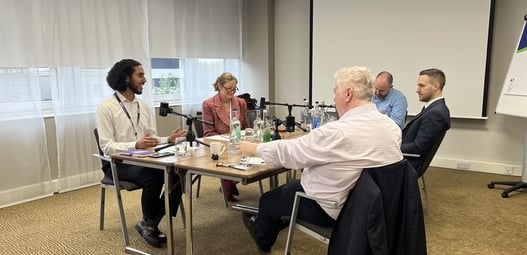
What motivates young engineers? Money? Great projects? Better career prospects? People might be surprised because, while those things are nice to have, many tell us that what they really want is more responsibility and trust, writes BESA technical director Graeme Fox.
At the recent BESA Conference, a session chaired by the Association’s President Claire Curran and featuring a panel drawn from our Future Leaders group discussed how employers could make themselves more attractive to the emerging generation. They also talked about what younger people had to offer including fresh ideas, instinctive understanding of digital technologies and a natural desire to ‘connect’.
While better pay was described as “desirable” several of the young engineers said that “feeling valued” and trusted to take on more responsibility was more important. They also said companies should re-think some of their recruitment messaging to make it more directly appealing to a wider cross-section of the population, which should include making sustainability a priority as the younger generation were increasingly engaging with the need to address climate change.
These issues are also discussed in our latest BESA Podcast – Next Generation on Net Zero with BESA Future Leaders.
The COP28 climate conference, which has just ended in the United Arab Emirates (UAE), debated if the world was getting any closer to our long-term commitments to limit rising global temperatures and ‘Keep 1.5 Alive”. While there was some progress, the overall answer was sadly “not really”, and despite claims of “uniting to deliver” the wording of the final ‘agreement’ was less than convincing.
Solutions
However, one report unveiled during the conference should prove as inspiration to our sector at least.
‘Keeping it Chill: How to meet cooling demands while cutting emissions’ from the UN Environment Programme’s Global Cooling Watch programme showed that global heating and cooling industries already have many of the technical solutions in place to cut their carbon emissions by 60% and should be aiming for at least 96% by 2050.
It argued that passive cooling, higher energy efficiency standards, and a speeded up phase down of some types of global warming refrigerant gases could cut the sector’s emissions rapidly and if those savings are combined with more clean energy integration, they would allow us to deliver some major quality of life benefits and limit the need for fossil fuel generated electricity.
This is just the kind of example of innovative engineering that can get us to where we need to be.
Before the conference started, Pope Francis sent a message to the global leaders reminding them that we share a “collective responsibility” not just to limit our own carbon emissions and environmental impact, but to do everything in our power to tackle this issue by making best use of whatever skills and opportunities we have been given.
Catholics ask God for forgiveness both for “what I have done and what I have failed to do”. In other words, it is not just doing the wrong things in our own lives, but also failing to be pro-active in the face of the climate crisis that is equally “sinful”, according to the Pope.
Building engineering professionals are in an incredibly privileged position because our work gives us an amazing opportunity to change the world for the better. We can ‘do things’ that make a better world.
 The emerging generation represented by our Future Leaders group feels strongly motivated to protest about climate change. Greta Thunberg encapsulates their passion to demand action from politicians and big business, but young engineers can do so much more than just call for change – they can make it happen in every built environment project…if they are given the opportunity to apply their fresh and innovative ideas by their employers and clients.
The emerging generation represented by our Future Leaders group feels strongly motivated to protest about climate change. Greta Thunberg encapsulates their passion to demand action from politicians and big business, but young engineers can do so much more than just call for change – they can make it happen in every built environment project…if they are given the opportunity to apply their fresh and innovative ideas by their employers and clients.
We should make that a huge rallying call to encourage more younger people to consider building engineering services as an exciting and rewarding career.
As Claire Curran said in her opening speech at the BESA Conference, buildings are crucial to our society on many levels and we need to make them work better to support people’s quality of life, and their health and wellbeing. However, they are also responsible for around 40% of total global emissions so anything we can do to make them work better gives us hope for the future.
Improving the built environment is critical to “the hopes and aspirations of this and future generations”, she added.
The delegates at the COP28 conference were debating a future that affects our younger generation most profoundly. They have the most to gain if we get this right and the most to lose if we fail.
Collaboration
And getting it right will require much better collaboration across disciplines. Young building engineers are naturally more collaborative and can break down silos by working closely with young architects, structural engineers, urban planners, environmental scientists, energy specialists and clients. We need that cross-disciplinary approach to produce the holistic solutions that are essential to improving the built environment.
They have also grown up with digital technologies so naturally adopt smart building solutions, AI, connected devices, and advanced energy management systems etc. They should be trusted to lead the integration of these technologies, ensuring that buildings are not only energy efficient but also future-proofed by being able to adapt to the impact of climate change and the emergence of even more advanced solutions.
The journey toward net zero begins with the passion and commitment of the next generation of building engineers, but it also requires more experienced colleagues and bosses to step aside and give them the headroom to make mistakes, learn and grow – and take responsibility for our collective future.
Find out more and how to join Future Leaders here.
You can also listen to the latest BESA Podcast – Next Generation on Net Zero with BESA Future Leaders and check out the BESA Net Zero Hub.
The BESA Academy also offers a range of free CPD and online courses which can help with the professional development of engineering staff at whatever stage of their career.

